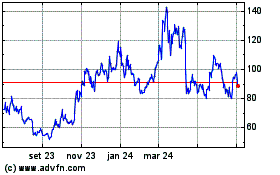AVAX and NEAR lead weekly gains
In the last week, the tokens AVAX from Avalanche (COIN:AVAXUSD)
and NEAR from Near Protocol (COIN:NEARUSD) registered significant
gains, with AVAX rising almost 60% and NEAR increasing more than
23%. The growth of AVAX can be attributed to its inclusion in the
Project Guardian of the Monetary Authority of Singapore, along with
partners like Onyx from JPMorgan (NYSE:JPM) and Apollo Global
(NYSE:APO). On the other hand, NEAR benefited from several
announcements made at the annual Nearcon conference in Lisbon.
Meanwhile, Bitcoin (COIN:BTCUSD) and Ether (COIN:ETHUSD) lost
value, falling 1.6% and 9.3%, respectively.
Crypto market stabilization after action from the US government
The threat of imminent liquidation in the cryptocurrency market
was averted after the US president, Joe Biden, signed a law to
avoid a government shutdown, according to Markus Thielen from
Matrixport. A shutdown would have interrupted government functions,
affecting approvals of Bitcoin ETFs and could lead to a 10% drop in
the value of bitcoin (COIN:BTCUSD). The approval of the law keeps
the hope of authorizing Bitcoin ETFs. The recent drop in inflation
in the US and the possible reduction of interest rates by the Fed
signal a recovery of risk assets, with expectations of a bullish
bitcoin market until December 2024. Mike Belshe, CEO of BitGo,
considers it “quite likely” that the US SEC will reject Bitcoin ETF
requests. In an interview with Bloomberg, he pointed out that the
rejection could be due to a lack of separation between exchanges
and custody, citing Coinbase (NASDAQ:COIN) as an example. Although
ETF analysts give a 90% chance of approval in January, the SEC has
a history of rejections due to concerns about market manipulation
and customer protection. The price of BTC has risen 45% since
BlackRock’s ETF request in June.
WisdomTree persists with new Bitcoin ETF request to the SEC
WisdomTree, an asset manager, is renewing its efforts to launch
a Bitcoin ETF (COIN:BTCUSD), despite past rejections. According to
James Seyffart, ETF analyst at Bloomberg, the company submitted an
amendment to the SEC, signaling its ongoing intention to launch the
ETF amid growing interest in cryptocurrency products.
Crypto community challenges SEC Gensler’s speech
Gary Gensler, chairman of the SEC, emphasized in a speech the
need for the agency to be an ally of honest businesses. However,
members of the cryptographic community, including the lawyer for
Ripple (COIN:XRPUSD), countered, accusing Gensler of contradiction
and prejudgment in actions against cryptocurrencies. They
criticized the SEC for allegedly favoring a corrupt system and for
becoming internationally irrelevant.
Avara expands presence in Web3 with strategic acquisition
Aave (COIN:AAVEUSD), now renamed Avara, is expanding its web3
portfolio with the acquisition of Los Feliz Engineering, a web3
innovation company from Los Angeles. The acquisition includes
notable products such as the Ethereum Family wallet and the
ConnectKit library. Benji Taylor, founder of the Family, joins the
Avara team as senior vice president. This move reinforces Avara’s
goal of building a robust and innovative web3 ecosystem, as
highlighted by founder Stani Kulechov.
Sushi adds support for native Bitcoin through expansion to
ZetaChain
The DeFi protocol Sushi (COIN:SUSHIUSD) made history by
integrating native Bitcoin (COIN:BTCUSD) into its system through
ZetaChain. This innovation, announced in a blog post, allows users
to trade BTC on 30 different networks without the need to convert
it into an ERC-20 token, as usual on Ethereum (COIN:ETHUSD).
ZetaChain, a layer 1 blockchain platform, offers Omnichain smart
contracts that facilitate safe and efficient transfers across
multiple blockchains. The Sushi-ZetaChain partnership promotes the
concept of DeFi 3.0, providing decentralized native BTC trading in
the DeFi space. With the integration of Sushi’s offerings,
including AMM Sushi v2, v3 AMM, and SushiXSwap, users will be able
to trade native BTC across various networks, exploring
unprecedented liquidity in the Bitcoin network.
PRC-20 tokens drive high gas fees on Polygon
Transactions with PRC-20 tokens on Polygon (COIN:MATICUSD), an
Ethereum (ETH) layer 2 network, raised gas fees to the highest
levels of the year. On November 16, the average gas fee reached a
peak of over 5,000 Gwei, with network users spending about $131,000
or 155,000 MATIC in fees, the highest value since last November.
Sandeep Nailwal, founder of Polygon, called the high fees “crazy”,
despite the good performance of the network, which recorded 6
million transactions in 24 hours. The increase in fees coincided
with the minting of the PRC-20 POLS token, which consumed more than
102 million MATIC in transaction fees. These tokens, similar to the
BRC-20 of Bitcoin Ordinals, allow the creation of NFTs on the
Polygon network. Interestingly, this rise in Polygon fees is
comparable to the increase in fees on the Bitcoin network due to
Ordinals and the similar, albeit less intense, impact on the
Litecoin network (COIN:LTCUSD).
EigenLayer prepares phase 2 to improve scaling and security on
Ethereum
The Ethereum protocol EigenLayer plans to launch the second
phase of its mainnet in 2024, enabling ether delegation to EigenDA
operators. This will strengthen the security of the protocol and
support scaling solutions, such as rollups. EigenLayer aims to use
staked ether for additional security and scaling services.
Patent confrontation in the blockchain domain industry
In a battle over patents, Nick Johnson of the Ethereum Name
Service (ENS) criticizes Unstoppable Domains for patenting
blockchain domain technologies. Accusing it of benefiting from ENS
innovations, he highlights the open-source philosophy of ENS, in
contrast to Unstoppable’s patent approach. He threatens legal
action unless Unstoppable formally commits to not restricting
innovations, while Unstoppable invites ENS to join the Web3 Domain
Alliance.
Ukrainian empowerment in investigation of crypto financial crimes
In Vienna, 14 Ukrainian officers received specialized training
in the investigation of crypto financial crimes, organized by the
UN and OSCE. From November 14 to 17, 2023, they are learning
advanced techniques and practical uses of investigative tools,
focusing on tracking illicit transactions on blockchains. Ralf
Ernst of the OSCE emphasized the importance of the training given
the increasing use of cryptocurrencies in Ukraine: “With the
growing use of virtual assets and cryptocurrencies in Ukraine,
there is an urgent need to strengthen the capacity of law
enforcement and supervisory bodies. This is essential for effective
investigations, increasing Ukraine’s resilience against money
laundering and other financial crimes.”
Jennifer Hicks leaves position at Binance
Jennifer Hicks, former head of counter-terrorism at Binance, has
left the world’s largest cryptocurrency exchange, as indicated on
her LinkedIn profile. Hicks, who previously worked at Chainalysis
and the US Navy, served at Binance for almost two years. Her
departure occurs in a context where the role of cryptocurrencies in
financing terrorism has been intensively debated in the US,
especially after reports on the use of cryptocurrencies by militant
groups.
Strike expands Bitcoin purchase for global users
Strike, a Bitcoin platform, is expanding its service globally,
enabling the purchase of Bitcoin in more than 36 countries.
Announced by founder Jack Mallers, this long-requested feature
makes buying Bitcoin easy and straightforward through the Strike
app. Although there is a 3.9% fee for users outside the US, Strike
plans to reduce this cost. The company is also collaborating with
Bitrefill to enable global purchases using the Lightning
Network.
Mastercard’s skepticism about the viability of CBDCs
Ashok Venkateshwaran of Mastercard (NYSE:MA) expressed doubts to
CNBC about the need for central bank digital currencies (CBDCs),
given customer satisfaction with conventional money. He highlighted
the complexity of adopting CBDCs, which must be as usable as
physical money. About 130 countries are exploring CBDCs, but only
11 have implemented them. Mastercard, through its partnership
program, is engaged in the development of CBDCs, having completed a
pilot in Hong Kong, but Venkateshwaran emphasizes that creating the
necessary infrastructure for CBDCs is a significant challenge.
Bitget Wallet offers innovation and expansion in the Turkish market
Bitget Wallet, formerly BitKeep, stood out at the Devconnect
conference in Istanbul as a leader in Web3 wallets and sponsor of
the UnStable Summit. The exchange plans expansion in the Turkish
market, focusing on Web3 services and local partnerships. The
company also emphasizes its influence in the Web3 ecosystem and
offers non-custodial OTC services, including NFT trading and DeFi
solutions on more than 90 blockchains.
Aave Token (COIN:AAVEUSD)
Gráfico Histórico do Ativo
De Jun 2024 até Jul 2024

Aave Token (COIN:AAVEUSD)
Gráfico Histórico do Ativo
De Jul 2023 até Jul 2024
